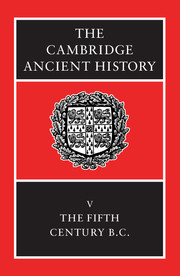Book contents
- Frontmatter
- Contents
- List of maps
- List of text-figures
- Preface
- 1 Sources, chronology, method
- 2 Greece after the Persian Wars
- 3 The Delian League to 449 b. c.
- 4 The Athenian revolution
- 5 Mainland Greece, 479–451 b. c.
- 6 The Thirty Years' Peace
- 7 Sicily, 478-431 b.c.
- 8 Greek culture, religion and society in the fifth century b.c.
- 8a Art: Archaic to Classical
- 8b Classical Cities and Sanctuaries
- 8c Rebuilding in Athens and Attica
- 8d Panhellenic Cults and Panhellenic Poets
- 8e Athenian Cults and Festivals
- 8f Athenian Religion and Literature
- 8g Society and Economy
- 8h Athens as a Cultural Centre
- 9 The Archidamian War
- 10 The Peace of Nicias and the Sicilian Expedition
- 11 The Spartan Resurgence
- Chronological Notes
- Chronological Table
- BIBLIOGRAPHY
- Index
- 1 Greece and Western Asia Minor
- References
8f - Athenian Religion and Literature
from 8 - Greek culture, religion and society in the fifth century b.c.
Published online by Cambridge University Press: 28 March 2008
- Frontmatter
- Contents
- List of maps
- List of text-figures
- Preface
- 1 Sources, chronology, method
- 2 Greece after the Persian Wars
- 3 The Delian League to 449 b. c.
- 4 The Athenian revolution
- 5 Mainland Greece, 479–451 b. c.
- 6 The Thirty Years' Peace
- 7 Sicily, 478-431 b.c.
- 8 Greek culture, religion and society in the fifth century b.c.
- 8a Art: Archaic to Classical
- 8b Classical Cities and Sanctuaries
- 8c Rebuilding in Athens and Attica
- 8d Panhellenic Cults and Panhellenic Poets
- 8e Athenian Cults and Festivals
- 8f Athenian Religion and Literature
- 8g Society and Economy
- 8h Athens as a Cultural Centre
- 9 The Archidamian War
- 10 The Peace of Nicias and the Sicilian Expedition
- 11 The Spartan Resurgence
- Chronological Notes
- Chronological Table
- BIBLIOGRAPHY
- Index
- 1 Greece and Western Asia Minor
- References
Summary
INTRODUCTION
In the context of modern Western thought a title which associates these two words raises expectations that the text so introduced will discuss the influence exercised on written works of the imagination by the doctrines of a religious establishment and the adaptation or critique of those doctrines by the writers of the works. For fifth-century Athens, however, the terms ‘religion’ and ‘literature’ (neither of which has a satisfactory equivalent in ancient Greek) serve to designate activities which differ significantly from their modern counterparts.
Literature, for us, is something written and to be read, but, though there were undoubtedly books and readers in fifth-century Athens, the principal medium of literary communication was not written text but public performance. The Homeric epics were recited by trained specialists who excelled in dramatic presentation; epinician odes for victories won at the great athletic games were sung by a dancing chorus at the victor's home; dithyramb, tragedy and comedy were competitive events mounted at the city's expense in the huge theatre of Dionysus. All this is not to say that there were no books or readers in fifth-century Athens; the evidence, literary and pictorial, suggests widespread literacy and even, in the final decades of the century, a book trade. But there can be no doubt that for most Athenians the message of the poets, lyric, epic and above all dramatic, was conveyed not by the written word but by the word spoken and sung.
Keywords
- Type
- Chapter
- Information
- The Cambridge Ancient History , pp. 268 - 286Publisher: Cambridge University PressPrint publication year: 1992



